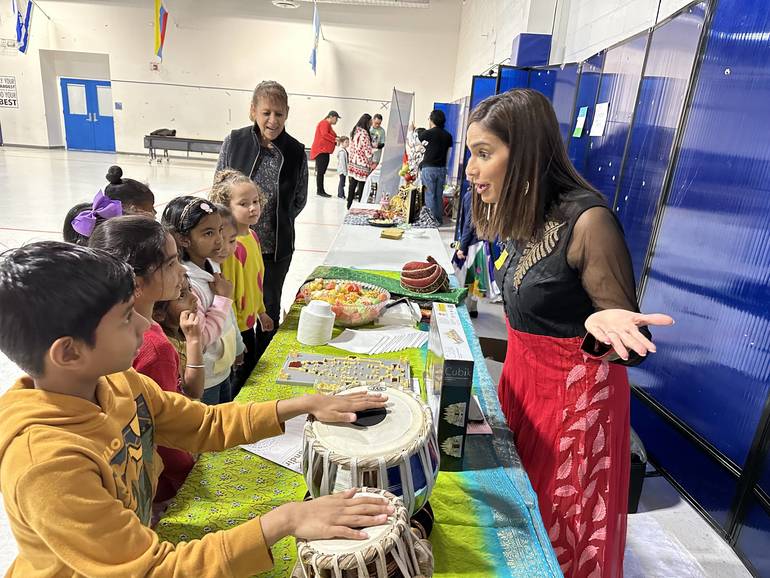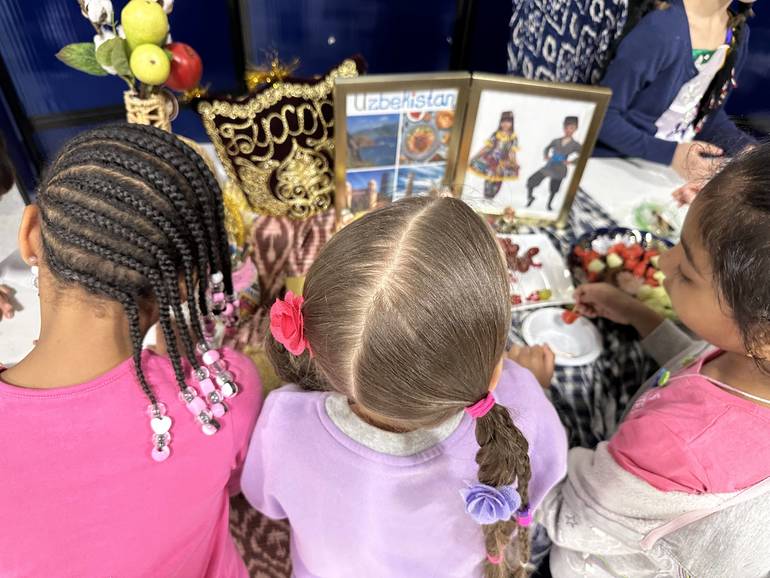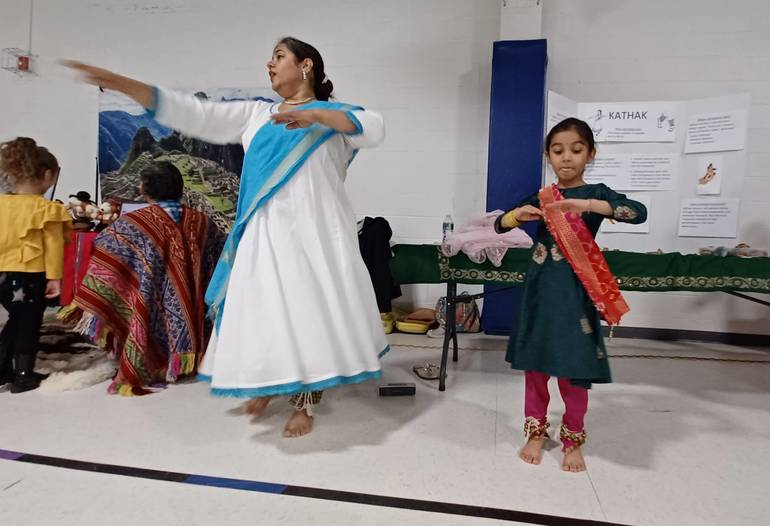







Kavya Grandhi was living in Avenel in 2019 when she heard a charter school in East Brunswick that was heavily focused on diversity and celebrating the many cultures that comprise Middlesex County.
Hatikvah International Academy Charter School quickly became the ideal choice for her daughters, Aadhya, 10, and Ameya, 6, prompting the family to move to North Brunswick just to be closer to the grades K-8 school in nearby East Brunswick.
“We loved the fact that so many families, from so many cultures and backgrounds, were going to school together,” Grandhi said. “And the fact that all the students learned how to have conversations in Hebrew made the school even more desirable. We all want our children to be able to speak another language. Why not Hebrew?”
The proud, eclectic culture of Hatikvah was on display Monday, Nov. 14, as part of the school’s annual International Village Fair. The school gym was transformed into an ethnic mecca of sights, tastes and sounds. Parents and other volunteers dressed in the traditional garb of their homeland, serving the food of their ancestors and explaining to about 225 students, in grades K-2, about the many wonders of their ethnicities.
It was an eye-opening experience for the students, as they learned the customs of far-flung native lands, such as Taiwan, Peru, Poland, Uzbekistan, India and, of course, Israel.
“There is always the misconception that Hatikvah is a Jewish day school,” said Dr. Marcia Grayson, the school’s director. “While we do teach Hebrew to all of our students, this is by no means a religious school. We do not teach Judaism. We teach about the many cultures of the world and celebrate them all.”
In fact, many of the parent ambassadors attending the fair were of Indian descent, of the Hindu religion. For them, Hatikvah, meaning “The Hope” in Hebrew, is about bringing together children to study in a truly global community, where students of all skin colors, religions, and backgrounds can learn to speak to one another in a language dating back 3,000 years.
Naomi Pickholtz, who has three of her four children enrolled at Hatikvah, and will enroll her 2-year-old as well, said she was drawn to the school from her experience at the private Rutgers–Livingston Day Care Center in Piscataway, also known for its tremendous diversity.
“I wanted to make sure my children continued in the same type of nurturing environment,” said Pickholtz, while managing the Israeli table, offering pita, hummus and a popular chocolate spread known as Hashahar Ha’Ole. “I am a child psychologist, so I recognize the importance of showing children that they may come from different places, but they are all the same. Hatikvah celebrates all of their cultures and faiths.”
As Pickholtz answered questions about hummus from an inquisitive kindergartener wearing traditional Indian clothing, other students nearby tasting Chrusciki, a sugar-dusted sweet associated with the pre-Lenten carnival in Poland.
A few steps away, other Hatikvah students watched a performance of the Kathak, one of the eight major forms of Indian classical dance. The origin of Kathak is traditionally attributed to the traveling storytellers in ancient northern India.
And yet in another corner, students could touch and feel an authentic poncho worn by natives who live in the colder, higher elevations of Peru.
“You can see that the students are very excited to learn about the cultures of their classmates,” noted East Brunswick’s Jay Sukumaran, whose son, Maximilian, attends the school. “They’re not shy about trying new foods, like the Gulub Jamun. When I tell them they’re like donuts dipped in syrup, they’re all in.”
The school’s strong embrace of diversity and focus on inclusion is why Shawntell Manning drives her daughter Aya, a third-grade student from Bordentown, each day. It’s a 30-mile trip, taking nearly an hour.
“They honor diversity and culture in such a beautiful way at this school,” explained Manning, who was offering exotic Caribbean fruit such as rambutans, papaya, and mango as a nod to her African-American culture as well as her husband’s Nigerian heritage. “I want to teach my children to see, learn and respect the differences in everybody, and I feel they do that perfectly at Hatikvah.”
Niche.com rates Hatikvah Charter School as an A+ school and as one of America’s most diverse schools.
The tuition-free school, which opened its doors in September 2010 as a partial-immersion Modern Hebrew language public school, now comprises 600 students representing 31 school districts. Learn more at hatikvahcharterschool.org
